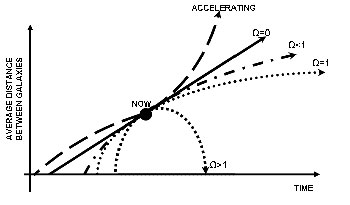 The history of the universe in a nutshell*On to the next question: "Yes, I have many burning universal questions. This one is a two-parter. Is there evidence that the universe's rate of expansion is slowing down? And if so, does it allow us to infer what would happen if expansion stopped, i.e. would it put the universe in stasis or would it contract? This keeps me up at night, so I would appreciate any insights."
The history of the universe in a nutshell*On to the next question: "Yes, I have many burning universal questions. This one is a two-parter. Is there evidence that the universe's rate of expansion is slowing down? And if so, does it allow us to infer what would happen if expansion stopped, i.e. would it put the universe in stasis or would it contract? This keeps me up at night, so I would appreciate any insights."
Einstein had the same question, and it kept him up at night also. In fact, he got this one wrong. Einstein had mistakenly assumed that the universe had to be static, looking exactly today as it will look tomorrow. When he formulated his improved version of the theory of gravity, known as general relativity, he found that his equations predicted otherwise.
The theory of general relativity not only describes how gravity effects planets and stars, but also how matter and energy affect space-time itself. The universe can actually expand or contract, depending on its composition. Einstein became very concerned when he saw this prediction from his own equations, and added a fudge factor known as the cosmological constant to "fix" the universe.
In 1929, Edwin Hubble, namesake of what may be the astronomy's greatest instrument, the Hubble Space Telescope, observed that almost all of the nearby galaxies were moving away from us. This observation was the first evidence that the universe is expanding AND the first evidence that Einstein made mistakes. Here is a site with further explanation and a less than exciting animation of the expanding universe.
So what's gonna happen next? Well, if there is enough matter out there, the universe may slow down, begin to contract, and eventually collapse on itself in a Big Crunch. Is there enough matter out there? We don't think so, we think that there is too much dark energy in the universe. This dark energy counteracts the affects of matter and pushes space apart.
